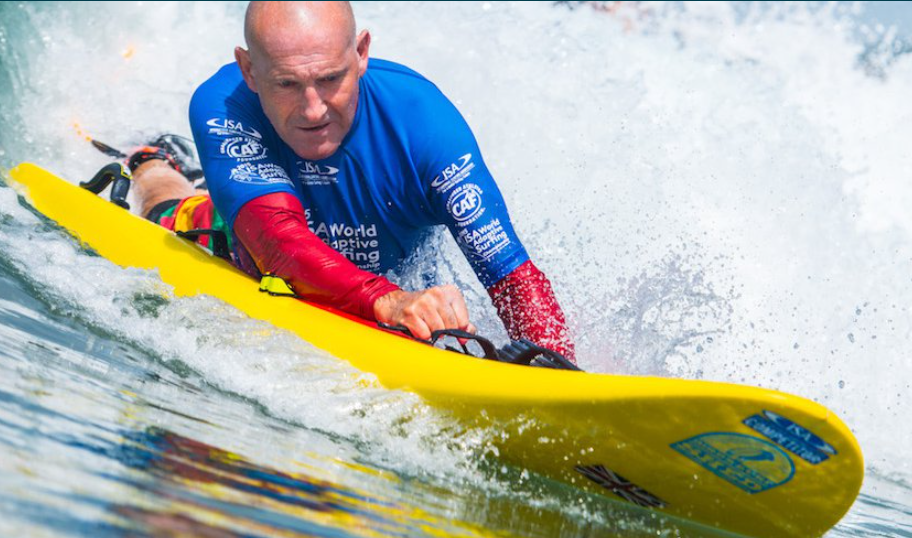Spike Kane was paralysed in a motorbike accident but that hasn't stopped him from doing what he loves most: being in the water. Spike now competes internationally in adaptive surfing championships and is one of our ambassadors for The Wave. He met up with us to talk about what surfing is like as a disabled person, how he overcomes challenges and why surfing means so much to him. Here's our surfer interview.
What do you most love about surfing?
There's a feeling of freedom, as everyone says, but there's also a purity to it – when everything is working you go into a 'flow state' where you become one with nature and the whole environment. The post-surf breakdown is always important – afterwards when you're sitting on the beach or in the bar or wherever, and you all talk about your rides, your waves and experience in the last session. Those shared moments stay with you forever.
How did you start?
I started working in Liverpool at the Liverpool Watersports Centre in the 1980s, and became a centre instructor. On days off I used to go to a beach in Anglesey, starting off in kayaks, and gradually moving up to surfing. Through the involvement in watersports I landed a summer job in the US teaching kayaking, sailing and canoeing in the Pacific North West. I fell in love with the place and began surfing there. I did that for about 25 years until I got injured in a motorcycle accident and became paralysed.
What kept you going after that?
I went straight back out to surfing prone, using a surfboard almost like a bodyboard. But the temperature in the Pacific North West is not the most conducive to being in the water with a spinal cord injury, so I headed off to Hawaii, and started entering competitions over there. I started meeting this big community of adaptive surfers from all over the world, which has been really inspiring.
What were the biggest barriers to you progressing as an adaptive surfer?
The biggest barrier was just getting to the water. Living in Seattle I had to cross sand dunes. All the friends I used to surf with before my injury helped me. Also paddling out to beach breaks, as paddling out is one of the most challenging things, being prone. I normally need an assistant to get out.
What has it taught you about life?
Patience.
What has it taught you about your body?
Well, the first day I went out after my injury, I came off the board and sank like a stone. That was new for me, and I realised my body isn't buoyant at all. So you learn to use a life jacket.
Does surfing de-stress you, and if so how and why?
Yes. If I get consistent sessions in then everything else I do on a daily basis is easier. My spinal cord injury level is really high, and all I have that really works is my arms and shoulders. I use a wheelchair, so I'm in a seated position all day and my legs are immobile. If I go surfing, then moving around, getting a shower, getting in and out of cars – all that becomes so much easier because my body is looser and more relaxed, and calmer.
What are the greatest myths or misconceptions about surfing?
That it's extreme. The mainstream media coverage tends to be about big waves, because it makes good viewing. I think that is something The Wave will help combat, because it will help create a level playing field, where someone with zero experience can learn in an environment that is entirely predictable.
Isn’t it embarrassing to do if you’re a newbie? How should someone deal with that?
Well if they're coming to The Wave, they'll find the predictability of the waves already makes it easier. They need to use the assistants, and use The Wave as a safe space, not just in a physical sense but emotionally too. Don't feel like, "I suck at this", but think "I am experiencing something."
What’s the best thing about the adaptive surfing scene?
The stoke [the distinctive feeling of excitement and pleasure from surfing] is the motivating factor for everyone involved in surfing, and it's never more pure than when it's in an adaptive environment. You don't have to be the disabled person to feed off the energy you get at an adaptive event – just helping someone get from the parking lot to the ocean, will mean you share the experience of adaptive surfing. I've never known anyone to leave the beach from an adaptive event not feeling stoked.
Photo credit: ISA / Maria Fernanda Bastidas (no copyright infringement is intended)
